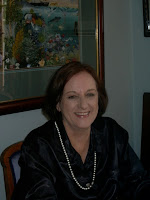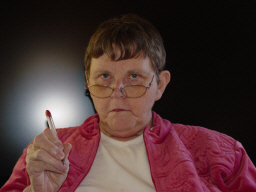When we start writing, almost all of us write badly. I have never seen a baby that looks now like it will fifteen or twenty years down the line—some beautiful babies turn into ugly adults and visa-versa. A baby gabbles nonsensically, and toddlers string garbled words together that often don’t make sense, but they’re learning. Regardless at how adept they are at using the language, kids are painfully honest. They express their emotional truth without apology.
More often than not, the first stories we write contains major flaws in the grammar or technique, yet they often have the same strange innocence and honesty expressed by children.
At around thirteen, girls learn how to put on makeup. Later, they may use plastic surgery and dress to hide impurities—and they learn how to deceive and hide personality defects.
Equate this to writing. As we grow, we add even more adjectives and adverbs, and we indulge in “clever” writing to fool the reader. Instead of striving for natural perfection, we embellish.
At adulthood, people who are willing to grow and become real learn how to accept their perceived physical flaws and concentrate instead on becoming better human beings. However, this metamorphosis into honest awareness of self may only happen years later—and sometimes it never happens, and those adults live under the illusion of being good and beautiful.
Writers are the same. Some grow and learn and become better. But others live under the illusion of being good writers despite repeated rejections from publishers and readers.
Hopefully, growth does happen, and that’s when we get real as writers. We strip off the makeup and get down to living—really living/writing. We learn to trust that our inner beauty is what counts—we learn to trust our writing. We also learn that readers aren’t stupid, that they get it without us explaining every last detail and describing every scene as though they lack imagination.
It’s okay to start out ugly. Write from the heart—just write like you used to—write badly. Forget about the silly concept of writer’s block—that’s a cop-out. Just write without embellishments/makeup.
Now, take that horrible writing and edit it, then repeat the process another hundred times or more. The only obligations we have as writers is to be honest with ourselves and grow so that we can entertain readers. This road to honesty and self-awareness is a lonely one and only we can travel it.
Love it or hate it, we know our own face, and we can only work with what we know. So it is with writing—work with what you know. If you know nothing about politics or forensics, then don’t go down that rabbit hole unless you’re prepared to do a mountain of research/plastic surgery—knowing that even with all the research, you still stand the danger of not ringing true, just as a face covered by plastic surgery is not the real you.
So write badly about what you know and be honest. Readers will love you more for being you and entertaining them with what feels real. Don’t get me wrong. Writing is all about smoke and mirrors, but it’s how you do it that counts. Just as charisma and personality can make a person with a plain face shine and force us to see beyond the physical.
Write badly, but then polish it until all we see is the charisma and personality.









